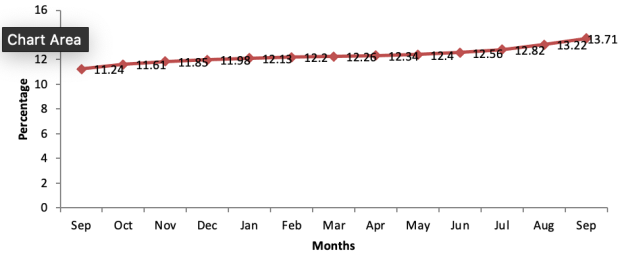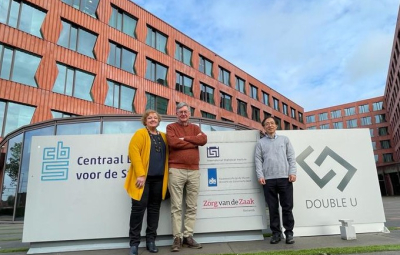It is very worrisome to see governments of developing countries, such as Nigeria, not using evidence from statistics and data science to inform decision making – rather relying on protest and strike actions by the populace.
The Nigeria population stood at 206,139,589 people as of 28th October 2020, ranked 7th in world population global ranking and with an estimated fertility rate of 5.42%. With this huge population figure for Nigeria, it was reported by National Bureau of Statistics (NBS) that 40% of the people in Nigeria live below the poverty line of 137,430 naira ($381.75 in US dollars or 322.392 Euros) a year. The question that comes to mind is: What is the situation of the Nigerian economy during the COVID-19 pandemic and what are the effects of the ENDSARS protests on the Nigerian economy from a statistics perspective?
COVID-19 and the Nigerian Economy
In April, a Brookings Institution article warned that Nigeria will without doubt be negatively impacted by the COVID-19 pandemic, as it is still dealing with a weak recovery from the 2014 fall in oil prices. In Nigeria, a COVID-19 case was officially identified on 27th February 2020 and a few more cases were identified shortly after (Effiong, et al. 2020). The consequences of COVID-19 on the economy and financial markets in Nigeria are economic lockdown of major cities (Abuja, Lagos, Ogun states) on 30th March 2020 leading to economic loss especially for daily income earners from small-medium scale businesses, and withdrawal of money by investors from the market and fall in oil prices (Ozili, 2020). On the global economy, the impact of COVID-19 also cannot be overemphasized (Mckibbin and Fernando, 2020) because it can lead to huge external debt of any country (Adenomon, et al. 2020).
A simple trend analysis of inflation rate in Nigeria during the COVID-19 pandemic from December 2019 to September 2020 revealed that inflation increased by an estimated 1.29% per month (from a simple linear regression model on the logarithmic scale). According to the National Bureau of Statistics (NBS), the unemployment rate for Q2 2020 was estimated to be 27.1% which was higher than the unemployment rate for Q3 in 2018 (23.13 %). High poverty, the negative impact of COVID-19 on the Nigerian economy, steady growth in the inflation rate, and high unemployment rate calls for evidence informed decision-making by the Nigerian government to come up with economic recovery polices to improve the life of the Nigerian people.

End SARS protest in Nigeria and its results on the Nigerian economy
The Special Anti-robbery Squad (SARS) is a special unit of the Nigerian Police Force that handles crime related to robbery, kidnapping and occultism, but it was discovered by Nigerian youths that innocent citizens suffered brutality from this squad. This action was followed by protest from Nigerian youth tagged “#EndSARS protest” with the following demands: disbanding of the SARS unit, releasing of activists from jail, prosecuting poor police conduct, evaluating and retraining officers, and increasing the salary of the police force. Other demands include good governance and creation of jobs. This protest thrived because majority of the youth do not have formal employment and there are few opportunities to get a good education. As mentioned earlier, about 40% of Nigerians live in poverty, as put by the BBC News article “How the End SARS protests have changed Nigeria forever.”
To address the End SARS protest and other matters, the federal government of Nigeria created a new 25 billion Naira Youth fund and plans to increase it to 75 billion Naira in 3 years.
The available data show that 40% of the people in Nigeria live below the poverty line, the inflation rate is high during the COVID-19 period, the unemployment rate is high, and there are security problems in the country. The Nigeria government should use these available data to inform policy that will improve the standard of living of the Nigerian people instead of making policy decisions after protest from the citizens.
My take home thought is that Nigerian government should be guided by informed and evidence-based decision-making using statistics and data science instead of using actions in response to protests or strikes.
References
Adenomon, MO.; Maijamaa, B. and John, DO. (2020) “On the Effects of COVID-19 outbreak on the Nigerian Stock exchange performance: Evidence from GARCH Models.” doi:10.20944/preprints202004.0444.v1
Effiong, A. I., Ime, R. N., Akpan, E. J., Mfreke, U. J., Edidiong, I. F., Abere, O. J., Abraham, U. P., Essien, M. O. and Ukpong, E. S. (2020). Assessment of Nigerian Television Authority (NTA) Ongoing Programme Awareness Campaigns on Corona Virus in Nigeria. Electronic Res. J. Soc. Sci. & Hum. 2(1):130-141.
McKibbin, W. and Fernando, R. (2020). The Global Macroeconomic Impacts of COVID-19. Seven Scenarios CAMA working paper 2019/2020. https://ssrn.com/abstract=3547729
Ozili, Peterson K (2020). COVID-19 Pandemic and Economic Crisis: The Nigerian Experience and Structural Causes. Available at SSRN: https://ssrn.com/abstract=3567419





